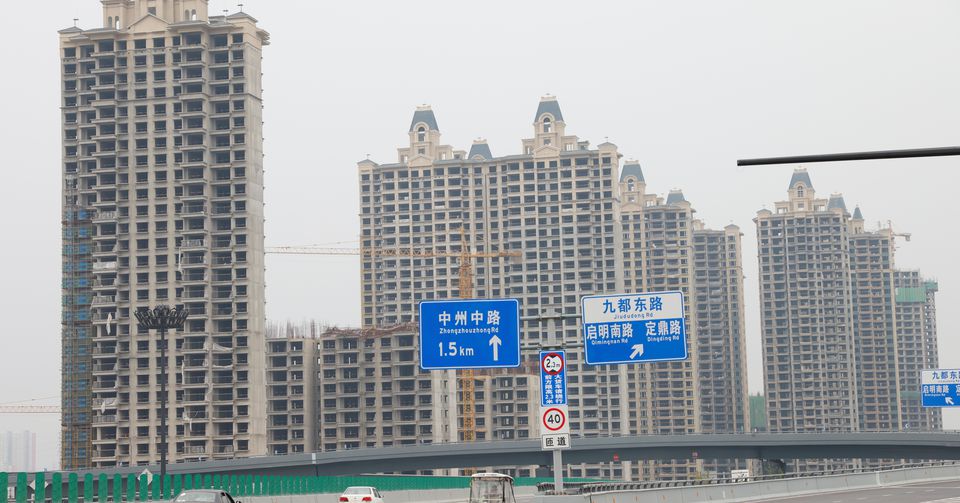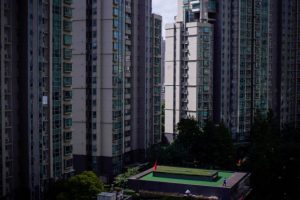Property shares rose in China on Monday on news that the government is looking to set up a 300 billion yuan ($44.4 billion) real estate fund to help stressed developers caught in a lingering debt crisis.
The fund – which will initially start with 80 billion yuan ($11.8 billion) – will pay for buy-ups of unfinished home projects, so they can be completed and then rented to citizens as part of a government plan to boost rental housing, according to a state bank official.
The real estate fund will be supported by China Construction Bank and the People’s Bank ofChina (PBOC), the person, who declined to be identified due to the sensitivity of the matter, said.
If the model works, other banks will follow suit with a target to raise up to 200 to 300 billion yuan, the official said.
The latest news propelled the Hang Seng Mainland Properties Index more than 5% early on Monday, and it was up 3.4% at the close, while the CSI 300 Real Estate Index rose almost 1.9%. The main Hang Seng Index dropped 0.2% on Monday, while the Shanghai Composite Index dipped 0.6%.
The property market debt crisis has been a major drag on the economy over the past year, prompting authorities to offer a variety of support measures to stabilise the sector.
ALSO SEE: China Ramps up Approval of New Coal Plants – Greenpeace
Financial information provider REDD first reported details of the real estate fund on Monday. The fund would support more than a dozen property developers, including embattled China Evergrande Group, REDD reported, citing unidentified sources.
The fund has secured 50 billion yuan from China Construction Bank and a 30 billion yuan relending facility from the People’s Bank ofChina (PBOC), the report said, adding it could be upsized to between 200 to 300 billion yuan.
Regulators and local governments would select the developers eligible for support from the fund, REDD said, adding that the fund could be used to buy financial products issued by the developers or finance state buyers’ acquisitions of their projects.
Beijing is also considering a national policy for issuance of special bonds for shantytown redevelopment, the report said.
Evergrande Debt Plan
China Evergrande, the world’s most indebted developer, is expected to announce this week a debt restructuring plan that will not only determine its future but also indicate how Beijing plans to overcome the deepening property sector crisis.
With more than $300 billion in debt, Evergrande has been at the centre of China‘s property quagmire since last year as the company struggled to repay suppliers, creditors, and investors in wealth management products after Beijing launched measures to control developers’ high debt levels.
The liquidity squeeze at Evergrande, whose entire $22.7 billion worth of offshore debt including loans and private bonds is deemed to be in default, subsequently engulfed other Chinese developers as their credit conditions deteriorated, and drove several smaller firms to defaults.
Evergrande’s eagerly anticipated offshore-debt restructuring plan, which China‘s former top-selling developer has said it will announce by end-July, is expected to serve as a template for its cash-starved peers.
“We’re all waiting for Evergrande’s proposal to get an idea of the terms and it’ll set a benchmark,” said a senior executive of a property developer who has done dollar-bond swaps and is currently in talks with advisers on a restructuring. “No firms would want to be the first because that’d be tremendous pressure.”
The restructuring proposal, though, will come at a time when China‘s macroeconomic conditions have deteriorated and the property sector is witnessing unprecedented challenges.
And Beijing is scrambling to reassure homebuyers who are threatening to stop paying mortgages on unfinished housing projects, in rare protests that’s set to spur a shakeout among developers.
Some offshore creditors of Evergrande said there was still disagreement on how it should repay and reorganise the debt, which could result in a delay in implementing the restructuring.
But the developer’s newly appointed CEO Siu Shawn told the 21st Century Business Herald late on Friday that the firm had reached basic consensus with several major offshore creditors on the principles and framework of the restructuring proposal. Evergrande declined to comment.
Debt Obligations
Investors will also be closely watching the role the state will play in the restructuring proposal.
Evergrande began talks with its offshore creditors about a restructuring proposal earlier this year, after advisers for a group of dollar bondholders demanded more transparency from the developer.
In May it was reported that Evergrande was considering repaying offshore public bondholders owed around $19 billion with cash instalments and equity in two of its Hong Kong-listed units.
After unveiling the restructuring proposal, the firm aimed to reach consensus with its creditors on specific terms by the end of this year, a separate source said early this month.
On the mainland, Evergrande has been extending its debt repayment obligations, though creditors are growing impatient. The group’s latest repayment extension proposal on a 4.5 billion yuan ($666.7 million) bond was voted down this month, while small suppliers, who are owed money, are also threatening to stop paying bank loans.
Evergrande also aimed to release a simple restructuring plan for its onshore debt as early as this week, REDD reported on Friday.
Raymond Cheng, head of China and Hong Kong research at CGS-CIMB Securities, said Evergrande’s proposal should also outline what it will do with its unsold projects and existing land bank, which would have a direct impact on the broader property market.
“Investors will not look at Evergrande’s proposal solely from a company perspective, but also a macro perspective,” Cheng said.
- Reuters with additional editing by Jim Pollard
NOTE: This report was updated with further details on July 25, 2022.
ALSO READ:
Funds See Promise In Battered Chinese Real Estate Dollar Bonds
Warburg Pincus Closes $2.8bn Inaugural Asia Real Estate Fund
PE Giant KKR Closes First Dedicated Asia-Pacific Real Estate Fund
























